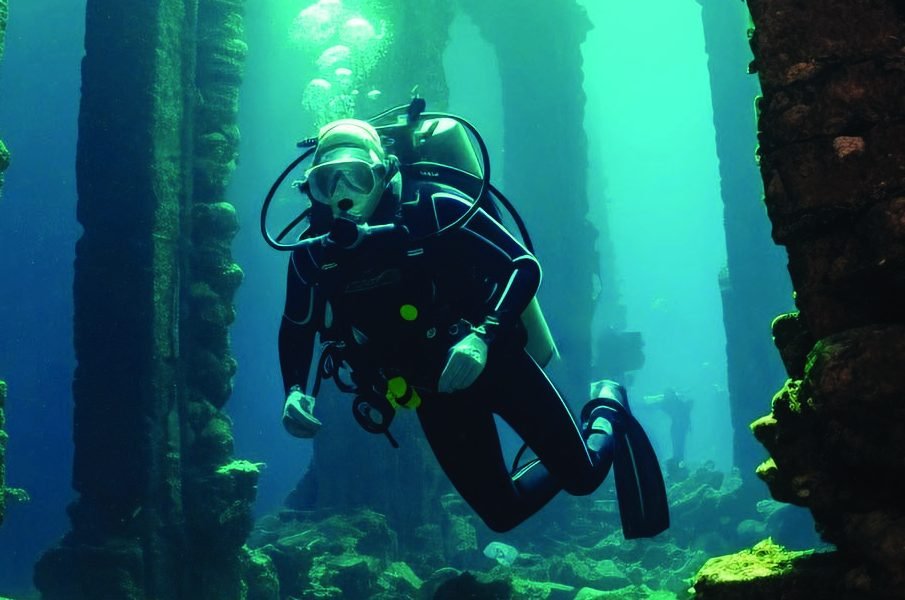No products in the cart.
Spiralling demand for deep sea divers
With offshore oil exploration and production set to intensify, a huge demand for deep sea divers, who inspect, maintain and repair sub-sea installations, is on the cards

The workplace is deep underwater; the hours long requiring hanging by an umbilical cord-like link which supplies life-giving oxygen, and a connection with the world above. That’s perhaps why deep or sub-sea divers are a small minority. It’s also why this vocation is offbeat, adventurous and financially rewarding.
Broadly speaking, sub-sea divers are of two types — air divers and saturation divers — with both categories trained to inspect, maintain and repair undersea installations which suffer heavy corrosion due to sea-water salinity. The differentiator is that air divers dive up to 50 metres and lodge in cabins after their shifts. Saturation divers plunge to greater depths and remain in special saturation chambers for the entire operation. The biggest employer of sub-sea divers is the offshore oil and gas industry.
As a training regime for deep sea office, every diver needs to acclimatise to the pressure he will be exposed to. Therefore, before a dive he is placed in a sealed saturation or ‘sat’ chamber aboard a ship in which the pressure is gradually increased to match the levels he will be diving to, a process which can take up to three days. Subsequently, the diver’s work begins underwater after he descends to the predetermined level in a diving bell. Saturation divers usually spend eight hours underwater per shift, before returning to the sat chamber to gradually decompress.
STUDY PROGRAMMES. The basic education required of commercial air and sat divers is completion of secondary school (class X) with physics as a compulsory subject, and ability to speak and write in English. However, certification by IMCA (International Marine Contractors Association) is mandatory for those seeking employment in registered companies. Apart from the Indian Naval Diving School, Kochi which conducts IMCA approved air diving courses, there are no certified training institutes. Therefore, aspiring Indian divers are trained and certified by diving institutes in the UK, South Africa, France or Australia. The Underwater Training Centre, Scotland and Institut Nationale De Plongee, Marseilles, France are two of the most popular institutes for Indian divers.
Opportunities for growth and advancement are good for qualified professional divers. The McKinsey Global Institute has projected a 2.2 percent annual increase in the demand for crude oil every year for at least another 20 years. With offshore oil production and exploration set to intensify, there will be a substantial hike in demand for inspection, maintenance and repair of sub-sea oil rigs and installations, necessitating a huge requirement for deep sea divers.
PROFESSIONAL PROFILE. “Experience and qualifications govern the remuneration of deep sea divers. At entry level, divers earn between Rs.20,000-30,000 per month. With experience and further training for saturation divers, earnings rise substantially to Rs.250,000-300,000 per month plus saturation bonuses,” says Tapan Banik, chief operating officer and vice president (operations) of Dolphin Offshore Enterprises (India) Ltd, which provides offshore oil and gas companies as far afield as Vietnam, China and Malaysia a range of underwater services, including air supply, mixed gas and saturation diving products and services.
A senior saturation diver of international repute heading the diving division of Dolphin Offshore, Banik realised his affinity for deep sea calm while serving in the Indian Navy, prior to graduating in economics and business management from Calcutta University. Between 1981-2001, he worked with Dolphin in various capacities as saturation diving supervisor/diver, area project manager, director and base manager. After 2001, he did short stints with Dulam International and ONGC’s Bombay High offshore oil field, and rejoined Dolphin Offshore as chief operating officer and vice president (operations) in 2009.
According to Banik, air and particularly sat diving are arduous and risky professions, requiring divers to be physically fit, daring and courageous. “While underwater, a diver could be asked to do different tasks such as inspection of structures, repair work on pipelines, underwater cutting/welding, non-destructive testing, photography, cathodic protection measurements and varied installation works. A diver is deemed ready for action after intensive theoretical as well as practical training and knowledge of these activities,” says Banik.
Happy to be back in Dolphin Offshore where he began his career three decades ago, Banik says the company employs over 200 divers during the peak season (November-May), and 100 in the monsoon. For youth proposing to enter this trying but remunerative profession, Banik has good news as Dolphin Offshore is in the process of establishing a diving school of international standards with foreign collaboration. “This institute which has been approved by the Central government will be sited in Maharashtra. It is the dream project of Rear Admiral (Retd) Kirpal Singh, executive chairman and founding-father of Dolphin Offshore, and is being actualised by Abraham Lucose, senior general manager, special projects and human resources, of the company. It will be comparable with any diving school internationally,” he says
(Excerpted and adapted from 101 Great Careers for the 21st Century by Indra Gidwani)
Employed by the offshore oil and gas industry, deep sea divers are required to inspect, maintain and repair undersea installations which suffer heavy corrosion due to sea-water salinity















Add comment